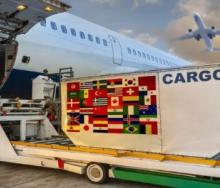African airlines are facing rising costs and supply chain disruptions that demand flexibility and adaptability to changing market conditions, Chapman Freeborn has said following June’s AviaDev Africa 2025 conference in Zanzibar.
According to the air cargo charter multinational, as Africa's young and rapidly growing population seeks more opportunities for travel, air traffic in the region is expected to rise by an average of 6.4% annually, “more than tripling by 2043.”
Conference panellist Linas Dovydėnas, the company’s president for India, Middle East and Africa, stressed that rising costs, finance hurdles and supply chain challenges could be overcome through solutions using ACMI – aircraft, crew, maintenance and insurance.
A statement release by the company highlights that ACMI leasing is a strategic response to Africa’s surging demand, offering airlines the flexibility to scale operations without the financial burden of aircraft ownership.
“This wet-leasing model provides airlines with aircraft and crew to handle seasonal peaks or bridge service gaps caused by aircraft maintenance,” the company contends.
Dovydėnas adds that there are over 1 500 aircraft available globally for ACMI leasing, with half operated solely under ACMI contracts. However, this capacity remains underutilised by African carriers.
“Leasing is gaining traction in Africa – African carriers are increasingly reaching out due to supply chain bottlenecks, inability to secure dry leases, and ageing fleets. But it's still often viewed as a short-term or emergency solution, which drives up costs,” Dovydėnas said.
This perception created broader trends, the company statement said, with African airlines approaching ACMI providers just weeks before peak season, leading to inflated prices.
Such procurement strategies ultimately undermine the cost-effectiveness that makes ACMI attractive in the first place.
Dovydėnas said that while African airlines were increasingly adopting ACMI, they still needed to shift from last-minute decisions to strategic forward planning.
He advocates embracing ACMI not as an emergency fix, but as a long-term strategic tool that can help generate profit.
“Proper planning allows airlines to scale flexibly during peak seasons without committing to year-round fixed costs. We recommend signing ACMI agreements one to three years in advance to secure better pricing and availability.”













